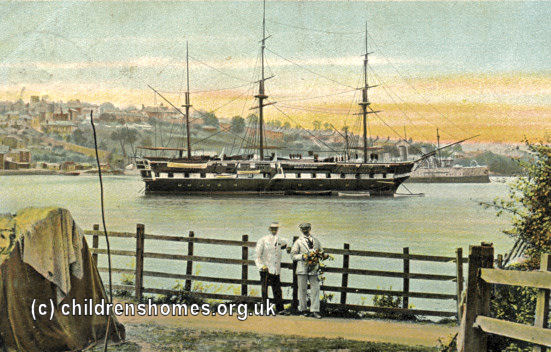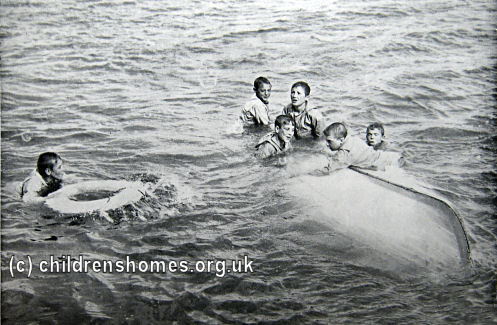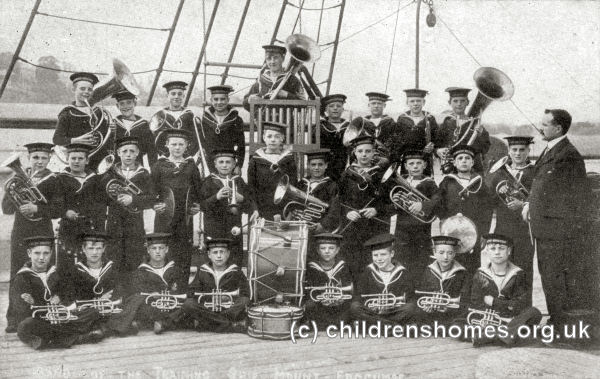Devon and Cornwall Industrial School Ship 'Mount Edgcumbe', Saltash, Cornwall
In May 29, 1877 the Devon and Cornwall Industrial School Ship 'Mount Edgcumbe', an Industrial School Ship, was certified to operate in premises at Off Saltash, Saltash, Cornwall. could accommodate 250 boys, aged 12-14.
The Training Ship Mount Edgcumbe started life at Woolwich as the 56-gun HMS Winchester. In 1861, the Admiralty lent her to the Marine Society who moored her on the Mersey, off Rock Ferry, for use as a cadet training vessel under the name Conway. After being returned to the Admiralty in 1876, she became the Mount Edgcumbe and the following year was anchored off Saltash in Cornwall and commissioned as an Training Ship for 250 boys aged 12 to 16. On May 19th, 1877, she was officially certified as an Industrial School Ship, allowing her to take boys sentenced by magistrates to detention. For boys placed by the courts, a weekly payment of seven (later eight) shillings was required. For voluntary cases, the cost was £20 a year.

Mount Edgcumbe off Saltash, c.1909. © Peter Higginbotham
The 1884 Regulations for the Admission of Boys to the Mount Edgcumbe Industrial Training Ship are shown below.
Until further notice, boys between the ages of twelve and sixteen will be received on board the "MOUNT EDGCUMBE", if sent by the Magistrates, with a medical certificate of good health, and approved by the Committee, from any of the NEIGHBOURING COUNTIES, under the following Acts of the Industrial Schools' Act, 1866, viz. —
CLAUSE 14 — Any person may bring before two Justices or a Magistrate, any child, apparently under the age of fourteen years, that comes within any of the following descriptions, namely:—
- That is found begging and receiving alms (whether actually or under the pretext of selling or offering for sale anything), or being in any street or public place, for the purpose of so begging or receiving alms.
- That is found wandering and not having any home or settled place of abode, or proper guardianship, or visible means of subsistence.
- That is found destitute, either being an orphan, or having a surviving parent who is undergoing penal servitude or imprisonment.
- That frequents the company of reputed thieves.
- The Justice or Magistrate before whom a child is brought, as coming within one of those descriptions, if satisfied on the inquiry of that fact, and that it is expedient to deal with him under this Act, may order him to be sent to a certified Industrial School or Ship.
CLAUSE 16 — Where the parent, step-parent or guardian of a child, apparently under the age of fourteen years, represents to two Justices or a Magistrate that he is unable to control the child and that he desires the child to be sent to an Industrial School, under this Act, the Justices or Magistrate, if satisfied on inquiry that it is expedient to deal with the child under this Act, may order him to be sent to a certified Industrial School or Ship.
Boys may also be sent under the second Sub-Section of the 11th or the 2nd Sub-Section of the 12th Section of the Elementary Schools' Act 1876.
In the case of boys who may not come under either of these clauses, and therefore cannot be sent by a Magistrate's order, they will be received into the Ship, provided those persons who are interested in them are willing to contribute towards their support £20 per annum for each boy; and provided, also, that the boy be physically fitted for a sailor's life, apparently between the ages of twelve and fourteen, be approved by the Committee and Medical Officer.
No boys who have been to prison can be received into the Ship.

Mount Edgcumbe life-saving drill, c.1904. © Peter Higginbotham

Mount Edgcumbe band, early 1900s. © Peter Higginbotham
Mount Edgcumbe had a sea-going tender called the Goshawk which was separately certified for Industrial School use on August 12th, 1899.
After leaving the ship, the majority of the boys found employment in the Mercantile Marine.
In 1910, Captain H Wesley Harkcom was appointed as Captain Superintendent and introduced many changes. He dispensed with the word 'Industrial' in the title, stopped using the birch on the boys, and he bought as much of their provisions from the local businesses as he could.
Mount Edgcumbe was closed down on December 4th, 1920. The ship was sold off a few months later and was soon afterwards towed to Plymouth where she was broken up.
Records
Note: many repositories impose a closure period of up to 100 years for records identifying individuals. Before travelling a long distance, always check that the records you want to consult will be available.
- The Marine Society, 202 Lambeth Road, London SE1 7JW. Holdings include: accounts, reports, correspondence etc. (1887-1928)
Census
Bibliography
- Hunt, Bruce E. T.S. Mount Edgcumbe Training Ship for Homeless and Destitute Boys (1977)
- Carridice, Phil Nautical Training Ships: An Illustrated History (2009, Amberley Press)
- Higginbotham, Peter Children's Homes: A History of Institutional Care for Britain's Young (2017, Pen & Sword)
Links
Except where indicated, this page () © Peter Higginbotham. Contents may not be reproduced without permission.


